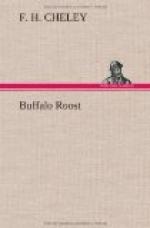“He’d sing all day as he worked, and never seemed to lose faith; but when the canyon road was extended, and the inn built, it took away the quiet and solitude from the place. The old man just picked up his belongings and went farther back into the mountains—no one knew where; but somewhere, I suspect, he is still talking aloud to the trees and making friends with the wild things, still giving his life to digging up dreams and living for hopes that will never be realized. It’s a strange disease, this gold fever. I’ve never had it, but I’ve heard Old Ben at the Inn tell how it’s nearly impossible for a man to go back to his work in the city after he has once seen the golden glitter and dug the precious metal from the earth.”
Willis had remained very quiet all through the story. A strange sadness seemed to have settled upon his spirit. Several times Mr. Allen addressed him, but upon receiving no reply turned and looked closely into the boy’s face. His head was thrown back, and he seemed to be lost in the beauty of the starry night. In a very quiet tone Mr. Allen said, “A penny for your thoughts, boy.”
Willis laughed a dry little laugh, and, turning to him, replied:
“O, I was just thinking. I hardly know what, exactly. I was thinking of how that old darky’s tunnel caved in. Do all tunnels cave in? I was thinking of my father.” He linked his arm through the “Chief’s” as they walked on up the canyon. “My father was a miner, you know. That’s how he lost his life.” Mr. Allen understood the mood now.
“You must tell me more of him some time, Willis. Was he like you?”
“Not very much, but I’m going to be like him, if I can,” replied Willis. “Sometimes, since I’ve been here in Colorado, especially here in the mountains, I’ve fancied that he was near me again, watching and guiding and keeping me company. It’s hard for a fellow like me not to have a father. Mr. Allen, I don’t believe the fellows who have them half appreciate them, do you?”
A long, loud shout came from ahead, which was answered by a dog’s bark.
“O you supper!” shouted Chuck.
“Ben, remember me,” cried another.
The inn was a one-story log building, built of rough spruce trees, just as they had been cut from the mountain. On the side next to the stream was a rustic porch. On the down-canyon end was built an immense old, stone fireplace. From the chimney top there was a procession of tiny sparks making their way upwards from the roaring wood-fire within. Here and there on the wall hung the hides of denizens of the woods. Behind the pine door stood an old-fashioned, double-barreled shotgun and a later model Winchester rifle. In the opposite corner stood two short-handled shovels and a miner’s pick, while on the wall just above the fireplace hung the head of a great buck that had one time roamed those very hills.
The fireplace, which occupied the center of the east wall, was large and very attractive. An old hand-made crane had been built into the firebox, and from it hung an old iron pot. The andirons were long, narrow slabs of granite, set on edge, upon which were piled logs of pine wood, burning merrily—not because it was a cold night, but because of its cheerfulness.




